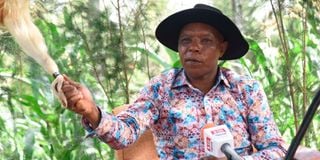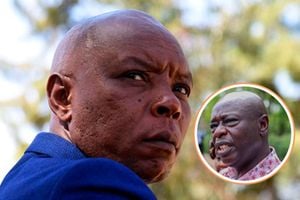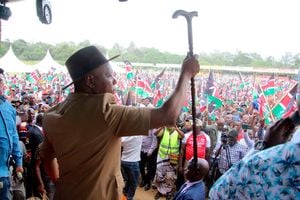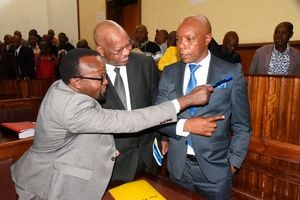
Former Mungiki leader Maina Njenga speaks to the media at his Rongai home in Kajiado county on January 1, 2024.
Former Mungiki leader Maina Njenga is busy criss-crossing Mt Kenya region. He is unpredictable and, like other politicians, shifts his loyalty at the switch of a button.
Right now, his eyes are on taming Rigathi Gachagua, the recently impeached deputy president who is working to fortify his political base. He is also seeking support for President Ruto – the punching bag within Mt Kenya politics.
That Njenga has ecstatic followers is not in doubt. That Gachagua’s fall marked his dramatic rise within Mt Kenya is also not in question. Politically, both Gachagua and Njenga have been at loggerheads, and neither is willing to be tethered.
By organising the first major pro-government rally in the Mt Kenya region since Gachagua’s fall as DP, Njenga has sent a clear message to the political class: he is a force to be reckoned with.
His ability to rally significant support has demonstrated to both allies and opponents that he is reliable and cannot be easily dismissed.
In doing so, Njenga has not only solidified his position as a key player in the region’s evolving political landscape but also signalled his readiness to shape the future of Mt Kenya politics.
By aligning himself with President Ruto’s Kenya Kwanza coalition, Njenga has become a significant asset to a regime that appears to have lost its once-solid political foothold in the Mt Kenya region following Gachagua’s impeachment.
Njenga has an axe to grind with Gachagua too— and seems to embrace the adage, "the enemy of my enemy is my friend."
When he was charged in Nakuru last year with seven offences, including illegal possession of a firearm, hosting an illegal meeting, and being a member of a banned sect among others, Njenga and his lawyers blamed the former DP for his predicament.
When the deputy public prosecutor withdrew the charges in November last year, at the time when Gachagua’s fall was imminent, it was not lost on observers that there was a political hand behind the move; like in most other cases where the DPP has withdrawn charges for the politically correct.
Njenga used his court appearances to show his might by mobilising and drawing crowds that forced police in Nakuru to prepare riot squads in anticipation.
On one occasion, the Nakuru court even ordered that the proceedings be broadcast on screens outside the courtroom after police attempted to prevent Njenga’s supporters from gathering in the court precincts.
By consistently deploying heavy police presence during Njenga’s appearances, the authorities unintentionally elevated him as a symbol of alternative power.
Njenga, ever the tactician, thrives on these confrontations with law enforcement. The altercations, as public relation gimmicks, throw him into the public eye, and more importantly, he deftly uses these moments to reshape his image, positioning himself as a peaceful man standing up against oppressive forces.
In this dance with the police, Njenga garners the attention and strengthens his narrative as a leader who defies the system while maintaining an air of calm.
This week, Njenga in a surprise move, called on his followers to support President Ruto and urged the community to welcome back Mt Kenya politicians who have been unable to hold public rallies or tour the region due to fear – after they voted for Gachagua’s impeachment.
The return of Mungiki to Mt Kenya, and with the blessing of the ruling class will no doubt cause ruckus in the region. Njenga evokes both fear and love in equal measure.
Over the years, Njenga has successfully crafted his image from traditionalist to "born-again' Christian.
However, he has not successfully shrugged off the image of being a member of the Mungiki gangs that left a trail of deaths and terrorised villages in Mt Kenya.
If President Ruto is to rely on the former Mungiki leader to organise politics in Mt Kenya region, he will be shifting from religious platforms which galvanised his campaigns – and will potentially pave the way for the gang’s political rise in the region.
Njenga had last year predicted to his followers that there would be a shift in power in the Mt Kenya region by the end of December – which was a clear prediction on the events that led to Gachagua’s fall as DP and which has reconfigured the region’s politics.
While the disillusionment over UDA's promises has also left a bitter feeling in the region, Njenga's rise as a centre of power might send shivers across the terrain, and his return will complicate the region’s politics.
It is not the first time that Njenga has been on State House’ side. In 1986, when he was organising the Mungiki gang, Njenga claims to have met President Moi who gave him Sh100,000. He said he bought a car and a plot.
By 1990, Njenga claims that Moi asked him to organise the youth and that he used to visit him together with former Laikipia MP Kihika Kimani. “Every time we went there, we could get Sh500,000,” he once told NTV.
For more than 34 years, Njenga has been synonymous with the Mungiki group that he led – as a gang of extortionists, kidnappers, pseudo-farmers, jobless youth, peasants, ‘hustlers’ and agents.
When Moi was under siege from the Opposition, Njenga— who had enrolled as a Kanu life member— was used by party insiders to organise its politics in the Mt Kenya region.
The return of Njenga at the centre stage of Mt Kenya politics has been in the making— first within the opposition, and now as a government ally.
On October 7, 2024, Njenga held a significant mammoth rally in Kenol, Murang'a, signaling his increasing influence in Mt Kenya.
The event, dubbed the Kikuyu Men's Conference, saw Njenga embark on a strategic publicity campaign, appearing on prime-time TV and capturing the attention of central Kenya’s political establishment.
At 55, Maina Njenga's life has been nothing short of a turbulent odyssey—marked by gunfire, abduction, prolonged imprisonment, and the chilling claim of having died and risen again.
His earlier years were defined by alliances with some of Kenya's most powerful figures: from supporting the late President Moi to aligning himself with Uhuru Kenyatta’s campaigns and mingling with former Prime Minister Raila Odinga.
At every political rally, Njenga always secured a prized front-row seat, a testament to his influence and connections.
Once aligned with Azimio’s powerful figures such as Odinga, Kenyatta, Kalonzo Musyoka, and Martha Karua, Njenga now seems to have followed Raila Odinga's faction into the government fold.
His focus appears to be shifting, with clear intent to disrupt Gachagua’s plan to consolidate Mt Kenya politics around his own identity.
Njenga’s entry into this complex political theatre has thrown the entire region back to the drawing board given that he enjoys some following among the youth. More so, the political landscape has shifted dramatically since Kenyatta's meeting with President Ruto and the subsequent appointment of his former loyalists to key Cabinet and parastatal positions.
In this context, Njenga's re-emergence is not merely coincidental but part of Ruto’s calculated effort to shore up a political base that has been shaken by the ousting of Gachagua.
With Gachagua’s fall as DP, Njenga began to position himself as a formidable alternative force, leveraging his constituency and following as his bargaining chip—much in the same way Odinga has masterfully negotiated power throughout his career.
Njenga’s ability to rally a significant base in the Mt Kenya region has become his greatest asset, enabling him to navigate the shifting political currents and stake a claim in the future of the region's leadership.
In recent years, Njenga’s prowess as a mobiliser has reverberated across the Mt Kenya region, signaling a meticulously coordinated effort to either challenge Gachagua’s grip on power, sow political paralysis, or further deepen the fragmentation of the region’s political landscape.
As the post-Gachagua’s fall dynamics continue to unfold, Njenga’s calculated moves stand poised to complicate Gachagua’s path to control central Kenya politics.
It could also backfire on Njenga and mark the end of his political career – and Mungiki too. Should Gachagua consolidate the entire central Kenya vote, Njenga’s political career, real and imagined, will come to an end.
If he manages to divide the Mt Kenya vote further, it will potentially lead to the fall of Kikuyu hegemony which has always relied on the solid numbers.
When Njenga resurfaced within opposition circles last year, his return to the centre stage of Mt Kenya’s politics sparked protests from UDA women MPs from the region, who called on then Interior Cabinet Secretary Kithure Kindiki (now the deputy president) to curb the resurgence of Mungiki.
But the objections ran deeper than mere fear of the Mungiki name. The fact that Mungiki had never been vanquished has long been an open secret within Mt Kenya, where the group has operated under a complex triple identity: part traditional sect, part self-help group, and part criminal mafia.
While the symbolic dreadlocks may have faded, Mungiki’s offshoots—independent of Njenga’s original extortionist gang, which was driven underground by the late John Michuki, Kibaki’s Interior Minister—continue to exert influence.
And now, Njenga is back to the government side and seeking to mobilise support for Kindiki who seems not to have gained enough traction in the region.
Though Njenga has never held any elected office, his true influence lies in his role as a power broker. He is frequently seen alongside top politicians, surrounded by bodyguards, and leads a lifestyle reminiscent of a rock star, with multiple homes spanning Laikipia, Nyahururu, Nakuru, Kajiado, and Nairobi.
His supporters dub him "Mr Chairman"—a title that raises eyebrows, especially given his consistent evasion of questions regarding the sources of his multi-million fortune.
This wealth, however, gives him the financial muscle to bankroll political movements and shape the course of political events.
In 2017, Njenga had ambitions to run for the Laikipia senatorial seat on a Jubilee ticket. However, his papers were rejected by the party secretariat, who cited integrity issues.
In response, Njenga filed an appeal with the Political Parties Disputes Tribunal, claiming he had spent Sh120 million to promote the Jubilee party.
He blamed both Party leader Uhuru Kenyatta and Deputy President William Ruto for his exclusion. The Jubilee party, however, insisted that Njenga clear his name with the Directorate of Criminal Investigations.
The entry of Njenga to President Ruto’s side will enliven Mt Kenya politics and the region will see more political drama.










